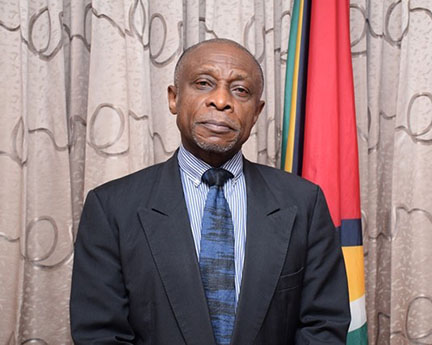Foreign Affairs Minister Carl Greenidge yesterday sought to temper expectations of a speedy adjudication by the International Court of Justice (ICJ) of Guyana’s border controversy with Venezuela, saying that a decision can take between two and six years.
“The process can be a long process, depending essentially on what actions Venezuela takes. I believe it could take up to six years. It could be as short as two years,” Greenidge yesterday told a press conference.
“Nobody should be surprised if at the end of two years the process is still ongoing. It is a long process and the public must know that. It is a difficult process…this is the first time that a referral to the court has gone from the [United Nations] Secretary-General in this way and, therefore, there are a number of firsts as it were but we can’t anticipate all the possible deviations and actions,” he added.
Guyana last month filed its application with the ICJ to confirm the validity and binding effect of the Arbitral Award of 1899 on boundary between the two countries and the subsequent 1905 agreement, following the decision by the UN Secretary-General Antonio Guterres to choose the ICJ as the next means of resolving the controversy, which stems from Venezuela’s contention that the award was null and void.
Greenidge, who will function as Guyana’s Agent in the proceedings before the court, said that in filing its application, Guyana has respected the Secretary-General’s decision and placed its faith in the ICJ to “resolve the controversy in accordance with its Statute and jurisprudence, based on the fundamental principles of international law, including the sanctity of treaties, the maintenance of settled boundaries and respect for the sovereignty and territorial integrity of States.”
Greenidge said when the case begins there will be periodic updates from the Ministry of Foreign Affairs but tempered expectations, especially from the media, that he or his ministry would be making comments and clarifying specific matters on the ongoing case. “We will have to clear it with the legal advisors,” he said.
While he did not name the legal advisors, Greenidge noted that one had been hired and that they will be paid, as already stated by government, from the US$15 million of the US$18 million signing bonus received from ExxonMobil with the revision of its Production Sharing Agreement for the offshore Stabroek Block.
“The decision of Cabinet was that US$15 million of that amount was for the payment of the lawyers,” he said, before quickly pointing out that more monies may be needed depending on the duration of the case.
“So the US$15 million may not be adequate [or] the US$15 million may be more than is needed for the moment. That is what it is. The Cabinet’s decision was that as the need arises each year, the money will be transferred to the Consolidated Fund from the Special Account in which it is held to meet the estimated expenditure on the lawyers…As I said to you, the process could take anywhere between two to six years and in those circumstances it is not possible for me to say to you, this is what it will cost; I can’t tell you that. I don’t know. The lawyers themselves don’t know because they don’t know what they will be called upon by the court to do,” he added.
In the application, Guyana has requested that the Court adjudge and declare that:
“(a) The 1899 Award is valid and binding upon Guyana and Venezuela, and the boundary established by that Award and the 1905 Agreement is valid and binding upon Guyana and Venezuela;
(b) Guyana enjoys full sovereignty over the territory between the Essequibo River and the boundary established by the 1899 Award and the 1905 Agreement, and Venezuela enjoys full sovereignty over the territory west of that boundary; Guyana and Venezuela are under an obligation to fully respect each other’s sovereignty and territorial integrity in accordance with the boundary established by the 1899 Award and the 1905 Agreement;
(c) Venezuela shall immediately withdraw from and cease its occupation of the eastern half of the Island of Ankoko, and each and every other territory which is recognized as Guyana’s sovereign territory in accordance with the 1899 Award and 1905 Agreement;
(d) Venezuela shall refrain from threatening or using force against any person and/or company licensed by Guyana to engage in economic or commercial activity in Guyanese territory as determined by the 1899 Award and 1905 Agree-ment, or in any maritime areas appurtenant to such territory over which Guy-ana has sovereignty or exercises sovereign rights, and shall not interfere with any Guyanese or Guyanese-authorised activities in those areas;
(e) Venezuela is internationally responsible for violations of Guyana’s sovereignty and sovereign rights, and for all injuries suffered by Guyana as a consequence.”
Guyana also lamented the fact that for decades it has been seeking a resolution through the Good Offices process but to no avail.
“Between 1990 and 2016, successive Personal Representatives were appointed by the Secretary-General for this purpose, including Alister McIntyre of Grenada (1990-1999, appointed by Secretary-General Pérez de Cuéllar), Oliver Jackman of Barbados (1999-2007, appointed by Secretary-General Kofi Annan), and Norman Girvan of Jamaica (2010-2014, appointed by Secretary-General Ban Ki-moon). Despite a quarter century of effort, however, the Good Offices Process failed to produce any progress in arriving at a settlement of the controversy,” the document, which is posted on the websites of the Ministry of Foreign Affairs and the ICJ states.
It also noted that an additional year was given by Guterres.
On January 30th, Guterres concluded that the Good Offices process had failed to achieve a solution to the controversy and therefore chose the ICJ as the next means of settlement.
For its part, Venezuela has said that Guyana’s resort to a judicial settlement is both “unacceptable” and “unenforceable” and it noted that it does not recognise the jurisdiction of the court as binding.
It has also proposed that the two countries restart diplomatic contacts to reach a resolution.










